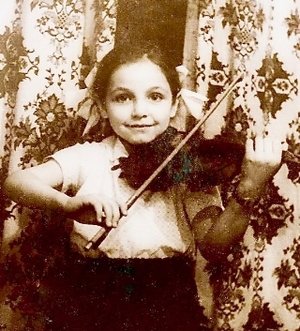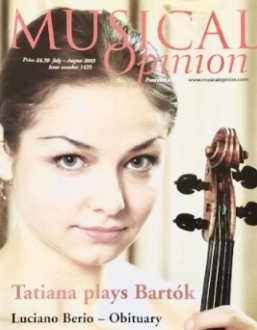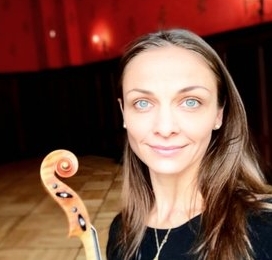Live radio is quite scary, but I took the plunge yesterday. It's an honour to be on the panel of judges for the BBC Radio 4 Woman's Hour Power List 2018, which is devoted to Women in Music and was launched yesterday. I'm the classical representative alongside some formidable figures from the pop world - producer Catherine Marks, broadcaster Jasmine Dotiwala and singer-songwriter Kate Nash - and we have quite a task ahead of us, whittling down the number of powerful women in the music world to select the top 40. The list will be announced in the autumn.
You can hear the podcast from yesterday's programme on the iPlayer, here. Happy listening.
Tuesday, May 29, 2018
Sunday, May 27, 2018
Liza Ferschtman: Remembering Philippe Hirschhorn
 |
| Liza Ferschtman Photo: Marco Borggreve |
Hirschhorn, born in the USSR, won the Queen Elisabeth Competition in Brussels, and later settled in the Netherlands - but his career ended tragically, with his death from a brain tumour aged only 50. His sound burned one up like no other.
There was more to say than I could put in the article, so here are some more of Liza's memories.
"For a while, Philippe played second violin in my father's quartet because he loved playing second - it involved less pressure and beautiful inner voicing. My parents both went to the same famous school in Moscow as he did - the Central Music School, for elementary and high school together, and Philippe came there when he was 13. They met then, in the same class. But he was expelled for misbehaviour after about a year - he was burning piano keys and being a bit of a rowdy kid. But, as later in life, at the same time everyone was a little bit in love with him: there was a very devilish-and-angelic thing about him.
He left the USSR already in the mid 1970s and my parents were aware of that, so when they emigrated they picked up contact again and became very close friends. The practical situation was also that he from the early 80s used to teach in Utrecht, round the corner from where we lived, so every weekend when he’d teach he’d stay with us. From as long as I can remember, he’d just be there, practically every weekend, so I always played for him. Sometimes he’d arrive on Friday and I’d be home but my parents weren’t, and he’d say 'OK, play me something...'
"He was not a particularly pedagogical teacher then - he was still playing a lot himself and he had no idea how to teach children at all. But I distinctly remember I would play something and he wouldn’t necessarily know how to explain something, but he would play it for me on my tiny violin and it would sound incredible! So I'd have that example - the he would give the violin back to me and say 'OK, I’m going to smoke a cigarette now, you can deal with that...'!
"A little later, in my my mid teens, I would play more regularly and more seriously for him. In the last two years he was unable to play any more himself. They didn’t know what it was for ages. He had neurological failure in his fingers, so they were trying all kinds of physiotherapy, but it was being caused by a brain tumour. Finally they discovered that and operated and he was fine for a short while. Then it came back.
"But when he started to teach me more seriously, there were some very crucial moments. I remember playing a little Kreisler piece, Tambourin chinois or something, with my mother and there was a modulation where something turns suddenly from minor to major quite suddenly. I remember distinctly that he complimented me - or dissed my mother a little bit! - by saying 'Look, she [Liza] got that colour change much better!' But pointing out to me, he was so sensitive to shifting colour - he was the one who taught me what happens at the end of a note, how to make a diminuendo, how to really change something: this awareness of sound at the end of a note, how things shouldn’t die. It’s almost a vocal thing, actually. Those seem tiny little things, but they became so important to me, about how to produce sound and how to listen.
"I won a youth competition when I was 14 and there was a video - and then there was a TV programme in which I had to play the same piece. He would watch both videos and point out to me why something worked or didn’t work in one or the other, not so much things you could put your finger on, but something about tension. And it’s important that someone points it out to you when you’re young, because you become much more sensitive to it and aware of it.
"Still to this day, I’ve been fortunate enough not to have lost too many people and he is still the biggest loss we have had in our family circle. As I said, everyone was always in love with him a little bit. It’s 22 years ago that he died, but he’s still so much in the forefront in my family. I have so many pictures of him in my violin case. I called him my uncle, but he was much more than that."
Here is Liza playing the Beethoven 'Kreutzer' Sonata with pianist Julien Quentin. Occasionally - very occasionally - I come across a musician who looks a bit like me and plays exactly as I'd have wanted to had I been any remote use as violinist, and I wonder if Liza might be a long-lost soul-sister. Don't miss her Bernstein if you're in London (book here).
Friday, May 25, 2018
Some real lessons in love and violence
 |
| Barbara Hannigan as Isabel, Stéphane Degout as The King, Gyula Orendt as Gaveston Photo: Stephen Cummiskey |
There has been a great deal of fuss this week, courtesy of questionable decisions at the Philadelphia Orchestra, about 'respecting the sanctity of the concert hall' (Read Philip Gentry's piece here.) Just the tired old standard defence against anyone objecting to decisions made by performers/managers that are...questionable – designed simply to silence those who disagree. It's saddening to see Yannick say 'Musicians are not men and women of words', as most of the ones I know bloody well are.
My latest evening at the Royal Opera House has left me wondering why anyone would consider there's anything resembling 'sanctity' in any performance house – I won't say 'any more' because it probably was never there.
Last night I went with a friend to see the new George Benjamin opera Lessons in Love and Violence. We sat in the amphitheatre - clear overview, great sound. It's also rather hot and airless and the seats, though 20th-century, are designed for 19th rather than 21st-century people, so you're very up-close-and-personal with your neighbours. None of this encourages an atmosphere of 'sanctity'.
Five minutes before curtain up, we were reading Martin Crimp's synopsis, wondering how far the opera relates to Christopher Marlowe's Edward II, when the couple to my right started having a massive row, fighting over some conversation that must have taken place just beforehand. When one voice was raised, the other shushed, which was a pity because it was getting interesting. He was demanding that she take something back and that they never discuss it again. She wasn't having any. Eventually he said, "We should just go". She didn't want to just go. She wanted to hear the opera. Then the lights went down, at which point the man shoved the woman's cardigan - which he'd gallantly been holding - back onto her lap, then went clambering over everyone's knees to the exit, just as the music began. What followed on stage was not exactly the thing to see or hear when you're having a bust-up of this magnitude, so one could hardly blame her for following suit at the halfway pause. At such moments, one can well understand, a house of performance is not a place of sanctity. It's a trap.
Then, about half an hour in, the couple on my companion's left started having a massive row too. She was checking her phone. He was telling her she shouldn't. He was right. She responded by becoming awfully upset. Tissues were produced. Maybe she didn't realise the performance house was a place of sanctity where you shouldn't get out your mobile. Did you know: If your light goes on, the whole theatre can see you and point, including the people performing, if they're so minded? This, of course, is nothing new. Most performances these days are liberally sprinkled with the tears of those who can't stay off their phones for two minutes, let alone 85.
Sanctity shmanctity.
What of the opera? It is wonderfully written: imaginative, concise, focused, clear. You could hear every word. The orchestration is magical, lit with fresh and inventive percussive effects and flickers of woodwind and brass. The pacing is varied, surprising, masterly: the most memorable section possibly the death scene, in which the King "experiences death" in absolute stillness and rapt quiet. There is no red-hot poker. The performers - Stéphane Degout as The King, Barbara Hannigan as Isabel and a magnificent line-up supporting - could not have been better. And yet there was startlingly little about the action that could make us begin to be interested in what was going on, and the staging, directed by Katie Mitchell (whom I usually admire) with designs by Vicki Mortimer, seemed stylised and confusing: a giant bed faced by rows of empty chairs, people trooping in and out even without much to do, and some soothing tanks of tropical fish.
If someone decides to create an opera out of Marlowe's Edward II, fine - but this adaptation fell somewhat short. Isabel becomes a one-dimensional figure despite Hannigan's best efforts: pure opera-woman cliché, a devious being with frustrated sexual appetite and characterless children. Contemporary sideswipes - issues over playing music while the country falls apart, or Trumpy-style references to "Dead Man Mortimer" which called to mind "Crooked Hillary" - feel slightly incongruous and unnecessary, especially as there wasn't one lead character anyone could reasonably relate to. Except I do want to know what happened to Felicity the Cat (brought in in a scarily familiar-looking carrier-box), whose deluded owner is brutally murdered: perhaps she got to eat some of the fish later... On the whole, admirable though the score is, I regret to say I'm with the critic who remarked that he was quite pleased to exit at the end in search of a burrito.
The true drama was in the audience – along with the real lessons in love and violence. All the world's a stage.
Play to your strengths
Planning to spend the bank holiday weekend catching up on a spot of practising?...well, if you're anything like me, you may be wondering where to start. I sit and stare at my books of Beethoven, Debussy and Schumann, feeling stumped before playing a note by the decision of which piece to pick and why. Brush up an old one or learn something new? Try something I know (well, think) I can still manage, or something that will force me to learn a new technical trick? Or what? Fortunately I've asked pianist, teacher and maker of anthologies Melanie Spanswick for a guest post and she says: play to your strengths. Here's the post explaining why. JD
Playing to your strengths
A guest post by Melanie Spanswick
Piano students working towards a graded piano exam, a diploma, a competition, a concert or any type of performance always want to know if the repertoire they have selected offers an eclectic programme. Is their choice of composers, piano pieces and range of styles and genres, suitably complimentary? The more discerning student also questions whether their selected repertoire actually suits their playing and, more importantly, showcases their technique and musicianship as it stands at present.
This last point is arguably most crucial. As pianists, we may have a firm view of our ‘ideal’ programme. It probably consists of several favourite pieces, topped off with a couple that we always meant to learn. And then there’s that one piece which we know will really challenge our technique, but which we feel might be a good addition to the programme to help us ‘improve’ our playing. We hope this will provide the necessary incentive, guiding us through the inevitable sticky practice sessions and lengthy preparation time. Piano playing is a complex task and without the inclusion of interesting music, reaching that pianist goal might seem a tad unrealistic.
When selecting a programme, there are numerous factors to consider, but the most vital is this: always play to your strengths. Programming is a very personal choice; it can be a lengthy process, and one totally dependent on a pupil’s ability right now. Any public performance (and I put an exam in this category, despite performing for one or two examiners) requires a certain level of mastery; preferably, complete mastery. A pupil must not only be confident with the technical demands of each work, but they must be able to deliver those pieces under pressure, succinctly and with panache, flair and a musical understanding. It’s not possible to do this if pieces are slightly beyond their capabilities or out of their comfort zone. This may seem obvious, but as an examiner, adjudicator, and teacher, I observe this issue on a regular basis. If your desire is to improve or work on technique, by all means do so via technical studies, exercises, scales, arpeggios or even within the confines of specific repertoire (and with the careful guidance of an expert teacher), but learn the necessary technique before actually attempting to perform the repertoire that requires it. And never expose your weaknesses in public – performance is a chance to show off!
 |
| Melanie Spanswick Photo: Sally Olsen |
When choosing repertoire, aim to discover a wide variety of music, and try to play or study works by a whole gamut of composers. This isn’t to say that you must doggedly learn everything by all the major composers, but you do need to have sampled a fair amount (or at least listened and examined the scores), so that you have formed opinions on styles and genres, and have discovered works which you feel will exhibit your pianistic talents. Observe how your favoured composers write for the instrument, and compare this with your particular skill set.
You may be a whizz at contrapuntal textures, in which case you’ll want to focus on J S Bach and some of his Baroque contemporaries, perhaps building a programme around one of his extended works such as the Italian Concertoor an English Suite. You may like to pair such a piece with a Shostakovich Prelude and Fugueor other works featuring counterpoint by Hindemith (from Ludus Tonalis,for example). Equally, the preludes and fugues by Mendelssohn or a fugue by Saint-Saëns, might be interesting offerings too. By homing in on this style and a fairly narrow band of composers, you will unearth a programme which plays to your strengths whilst also offering a balanced selection.
Similarly, those who excel at rapid, complicated passagework will want to build their programmes accordingly. They may choose to spotlight Scarlatti, Mozart, Haydn, Mendelssohn, or many other such composers. It’s possible to add a couple of Twentieth or Twenty-first century works into the mix, whose style also exemplifies these qualities. A useful tactic to apply before making a final decision on a programme, is to categorise composers according to their most prolific technical elements (this is also an absorbing exercise). You can then explore those composers and works which resonate with your skill set.
I would hope a piano teacher would discuss programming in detail; this is one reason why it’s a good idea to be able to talk frankly with your tutor. If you don’t resonate with their suggestions, you must feel free to say so, and they should guide you to an acceptable solution, but all within your current standard of playing.
When helping students select a programme, I try to encourage them to seek a comfortable, attainable selection; one which they will be happy to work on for a few months. Most pupils enjoy learning a Classical sonata, and as this is standard repertoire, I think it’s a prerequisite. Such a work can be juxtaposed with several modern or contemporary choices. I am keen to introduce new pieces to students, and they generally relish traversing lesser-known works. This happy marriage can result in accomplishing a higher level of technical and musical prowess.
In my recent two-book piano course, Play it again: PIANO (published by Schott Music). I present works of many different musical styles. Whilst choosing these works, I was mindful to select a balance of pieces that would not only give pianists the opportunity to play to their strengths and show off their skills set, but also explore pieces that might technically challenge them. And, to this end, each piece is prefaced with technical and musical information on how to actually learn it.
Whenever and wherever your next performance opportunity presents itself, take time to think about what you want to play and whether that piece is suitable for your current pianistic skill. When you adopt this mind set, your playing will almost certainly transform and you’ll become a much more confident pianist.
Tuesday, May 22, 2018
What price 'success'? A guest post by violinist Tatiana Berman
The violinist and artist Tatiana Berman is one of three musicians featured in Forte, a new documentary by American filmmaker David Donnelly exploring the notion of 'success' through the eyes of three female musicians - all of them strong personalities pursuing their dreams. Using classical music as an example, the film looks at the societal expectations women face today as private and professional individuals.
To fund it, they've got a Kickstarter campaign, which has just three more days to run. Please support them here!
Below is the trailer and a guest post from Tatiana about her own experiences...
JD




To fund it, they've got a Kickstarter campaign, which has just three more days to run. Please support them here!
Below is the trailer and a guest post from Tatiana about her own experiences...
JD
The Journey of the Female Soloist
by Tatiana Berman

To become a professional soloist, you have to start young. For me, it was five. My mother and father were musicians, so naturally I wanted to play. At 14, I was accepted into the Menuhin school, one of the most prestigious music schools in the world, on a full scholarship. My mother had passed away unexpectedly two years earlier, so making the decision to leave my father and younger sister wasn’t easy. I didn’t speak English, but I knew it was an opportunity that I couldn’t pass up. While in school, I had many incredible experiences including solo performances with orchestras in London and Switzerland. I also had the privilege of working with the late Lord Yehudi Menuhin and performing the Bach Double for Queen Elizabeth and Prince Charles at Buckingham Palace when I was just 17.

At 18 I was awarded the prestigious Queen Elizabeth the Queen Mother Scholarship to the Royal College of Music. Since my scholarship only covered tuition I had a strong incentive to win the prize at competitions — I was playing to survive. After winning some of those awards things started to happen and my career looked promising. That is until I met someone at the young age of 21, and suddenly my priority to start a family outweighed my career ambitions. It’s not unusual for a young soloist, fresh on the international circuit, to perform 100 concerts a year; however, that lifestyle is not conducive to starting a family, especially if you’re a woman.
I was confident in my ability, but if you’re a soloist, the reality is that your career is a chess game, one you have to be completely determined to win. You have to impress the right people. Mostly the male-dominated world of conductors, who a lot of the time are still the decision makers. You also have to devote a ridiculous amount of time practicing and developing your fan base on social media. It takes complete dedication, the right connections, monetary investment, and pure luck to be at the right place at the right time. You are also pressured to play the “right” repertoire for a long time before you are free to do what you really want. Over the years, I had seen so many of my colleagues become “successful” by industry standards. However, there were countless brilliant musicians who were simply overlooked or didn’t know how to play the game, and in their complete state of devastation they simply gave up on their dreams. But if we take a closer look, is there any evidence of a correlation between that industry stamp of approval and real happiness? Perhaps not.

Fast forward to 2018. I am the mother of three beautiful girls, living in the most unexpected of destinations; Cincinnati, Ohio. The Constella Festival, which I founded in 2011, wrapped its seventh season this year. I’ve worked really hard at this festival, and it’s allowed me to do innovative things. It became a platform to experiment with different artistic mediums. Constella was among the first festivals to present multi-dimensional programming that included digital and visual art, music, film, and dance. We’ve presented over 60 world premieres, and most recently developed a program that attracts a new type of audience, which is not your typical classical music crowd. (www.NotSoClassical.com).
I think of all those talented musicians who didn’t keep going because they didn’t fit into the traditional mold of success, but the world needs musicians now more than ever. It’s time for more of us to make our own rules and to let our passion fuel innovation and entrepreneurship within our cherished genre. Classical music is an industry with a lot of tradition, but that doesn’t mean we have to live and die by those traditions. Everyone, especially women, must have the confidence to create their own definition of success, and design lives that don’t force us to choose between personal dreams and professional ones. Despite an all or nothing culture, there can be a happy medium.
TB

Tatiana Berman is a violinist and artist. She is one of the stars in the upcoming documentary Forte which tells the story of three strong women pursuing their dreams. You can support the film by contributing to its Kickstarter campaign here. Rewards include tickets to the world premiere in New York, private screenings, art prints, copies of the original score, and autographed posters. Film screenings can be donated to a school of your choice. The campaign ends on May 25th.
Labels:
David Donnelly,
Forte,
Tatiana Berman
Subscribe to:
Comments (Atom)

